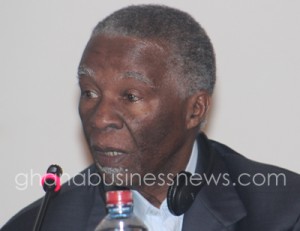Thabo Mbeki goes to US to discuss illicit financial flows

Former South African President and Chair of the High Level Panel on Illicit Financial Flows (IFFs), Thabo Mbeki is expected to make an official visit to the United States of America as part of advocacy efforts on illicit financial flows.
According to a statement by the UN Economic Commission for Africa (ECA), Thabo Mbeki and his delegation will hold consultations and undertake advocacy with various stakeholders in the United States, including: the US government entities relevant to addressing illicit financial flows from Africa, the International Monetary Fund (IMF) and World Bank officials, the Economic and Social Council (ECOSOC) of the UN, African Ambassadors to the UN and international diplomatic corps
He will also hold meetings with representatives of civil society, private sector and academia.
His planned visit to the US from February 16 to 19, 2016, is the first step of a revamp of his global advocacy on the issue, after member Heads of State of the African Union (AU) made a request for his continued regional and global advocacy on the issue – the Special Declaration on IFFs passed at the 24th AU Summit at Addis Ababa in January 2015.
In a move that the ECA describes as “both swift and unanimous”, African Heads of State showed a full understanding of the problem and declared that “all forms of illicit financial flows including tax evasion by multinational corporations and money laundering constitute a drain on the resources required for Africa’s development.”
His visit interestingly, also coincides with recent reports that the US is growing into a lucrative offshore financial centre and a facilitator of illicit financial flows. According to Bloomberg Business Week, shifting money from offshore secrecy havens to the US is now a brisk business and more accounts are being moved from havens like the Bahamas and the British Virgin Islands to the US.
In 2015 the US was ranked the third tax haven behind Hong Kong and Switzerland, by Tax Justice Network, an organization concerned about tax avoidance, tax havens and illicit financial flows.
While not as financially secretive as Switzerland, the US is big and its size considerably accounts for its rank: the organization says that America provides for nearly 20 per cent of the offshore financial market.
As chair of the high level panel on illicit financial flows which was established in 2012, Thabo Mbeki was assigned the duty of helping to increase cooperation between Africa and its external development partners in order to promote a better global understanding of the scale of the problem for African economies.
The Special Declaration also delivered several other mandates including the effective dissemination of the Panel’s findings and recommendations by the Chair and members of the Panel.
An estimated $50 to $60 billion is illicitly moved out of Africa annually, denying governments resources that could go into development.
The continent which is still plagued with numerous challenges in its quest for development, has the highest ratio of illicit financial outflows to GDP, driven largely by multinational corporations (60 per cent) and to a lesser extent, organized criminal groups (35 per cent) and corruption (5 per cent) by individuals and other groups.
Global volumes of IFFs reached $1.1 trillion in 2013, and the developing world lost $7.8 trillion between 2004 and 2013, the last year for which data are available, according a report by the Global Financial Integrity (GFI), a Washington DC-based research and advisory organization.
Over the ten-year time period of the study that was conducted by GFI, an average of 83.4 per cent of illicit financial outflows were due to the fraudulent misinvoicing of trade.
The report also compared IFFs to official development assistance (ODA) and foreign direct investment (FDI) and found that IFFs have exceeded those measures—combined—for seven of the ten years of the study.
“Despite these substantial recorded inflows, the continued growth of unrecorded, illicit outflows has a pernicious impact on development aspirations in many countries. For example: for every dollar of ODA that entered the developing world in 2012, ten dollars flowed out illicitly,” it added.
The report discovered that taken together, growth of ODA and FDI (6.8 per cent a year) just barely outpaced the change in IFFs (6.5 per cent a year) between 2004 and 2013. Most of that growth came from increased FDI, as ODA to developing countries has stagnated over the period.
According to the ECA, Thabo Mbeki will undertake future consultations in Europe with the European Union (EU), the British government and the Organisation for Economic Co-operation and Development (OECD), and share the High Level Panel’s findings and encourage the adoption of relevant global policies and agreements against the situation.
By Emmanuel K. Dogbevi & Emmanuel Odonkor
